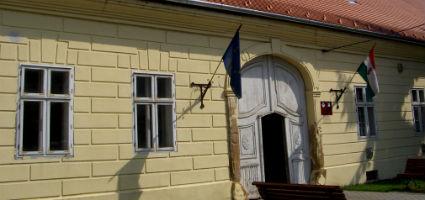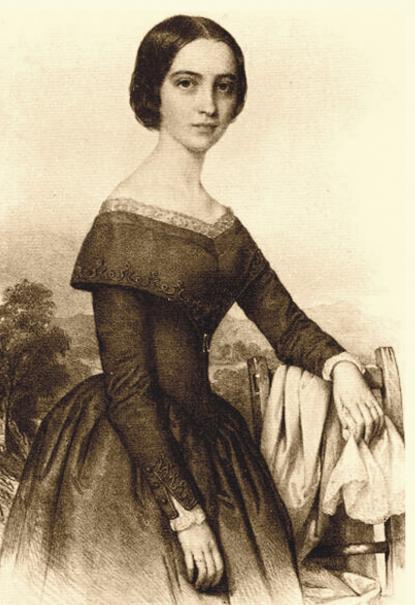2025. April 4. Friday
Museum Piece Compilation of the Soma Orlai Petrics Cultural Center - Mezőberény
 |
Address: 5650, Mezőberény Fő út 1-3.
Phone number: (20) 225-4846
E-mail: opsgy@mbereny.hu
Opening hours: Tue, Fri 10-12, Wed, Thu 14-16
|
The exhibition has closed for visitors.
2010.05.27. - 2010.12.31.
Museum tickets, service costs:
|
Ticket for adults
|
220 HUF
|
|
|
Ticket for students
|
110 HUF
|
|
|
Ticket for pensioners
|
110 HUF
|
|
|
Guide
|
500 HUF
|
Júlia Szendrey was born in December 1828 in the Újmajor of Keszthely Her father, Ignác Szendrey, was the officer farmer for the counts Festetics, later on for the Károli family. Not much is known about her mother, Anna Gálovics. She was a Croatian-Armenian descendant.

Júlia Szendrey went to school in Mezőberény in 1838-1840 in a girls' school probably operated by the Festetics family. Later on, she continued her studies at the Tȁnczer-Lejtei girls' school in Pest. After leaving school, she returned to the house of her father in Erdőd. Her best friend lived in Nagykároly, her name was Mária Térey. It was her who introduced Júlia to the love of her life, Petőfi. It was also Mária who conciliated the two men when arguing over something and aided to the nicest marriage of 19th century Hungarian literature.
Júlia was a very brave girl. She opposed her father, left him and lived the life of intellectuals alongside her husband in the capital city. Gábor Egressy, the famous actor rented a flat for Sándor Petőfi, where he and his new wife moved in after their honeymoon. First they were roommates with Petőfi's friend from Komárom, Mór Jókai.
Júlia Szendrey was a celebrated woman of social life. During the events in March, and afterwards, she never left her husband, even followed him to the front in Transylvania. She and her son, Zoltán, were staying in the home of the priest Miklós Miklós in Torda waiting for Sándor to return. But he never did. She spent the end of the summer in Kolozsvár. During the winter of 1848/1849 she searched the region of the battle in Fehéregyház with Sándor Balázs. But they never found Petőfi's grave.
The young widow moved to Pest. She, for her and especially her son’s sake, married Árpád Horváth. Her second marriage was unhappy, but fruitful: she gave birth to four children, of whom only three grew to be an adult. Attila Horvát, Árpád Horvát Jr and Ilona Horvát.
Mrs. Horvát, Júlia Szendrey became a poet and novelist during his second marriage. But her talent had been noticed by Petőfi and Mór Jókai earlier. She translated tales by Andersen and continued writing her Diary. She also translated books. She translated the biography of George Sand by Jules Sandeau entitled 'Marianne'.
She left Árpád Horváth one year before her death, as he could not stand women who were involved in art. She died in Zerge Street, with József Tóth by her bed. He preserved her last letter and Diary for posterity. After his death, his son took care of the documents. Then, in 1928, he gave them to away researchers.
(Except from the essay of the literary historian Rita Ratzky.)

Júlia Szendrey went to school in Mezőberény in 1838-1840 in a girls' school probably operated by the Festetics family. Later on, she continued her studies at the Tȁnczer-Lejtei girls' school in Pest. After leaving school, she returned to the house of her father in Erdőd. Her best friend lived in Nagykároly, her name was Mária Térey. It was her who introduced Júlia to the love of her life, Petőfi. It was also Mária who conciliated the two men when arguing over something and aided to the nicest marriage of 19th century Hungarian literature.
Júlia was a very brave girl. She opposed her father, left him and lived the life of intellectuals alongside her husband in the capital city. Gábor Egressy, the famous actor rented a flat for Sándor Petőfi, where he and his new wife moved in after their honeymoon. First they were roommates with Petőfi's friend from Komárom, Mór Jókai.
Júlia Szendrey was a celebrated woman of social life. During the events in March, and afterwards, she never left her husband, even followed him to the front in Transylvania. She and her son, Zoltán, were staying in the home of the priest Miklós Miklós in Torda waiting for Sándor to return. But he never did. She spent the end of the summer in Kolozsvár. During the winter of 1848/1849 she searched the region of the battle in Fehéregyház with Sándor Balázs. But they never found Petőfi's grave.
The young widow moved to Pest. She, for her and especially her son’s sake, married Árpád Horváth. Her second marriage was unhappy, but fruitful: she gave birth to four children, of whom only three grew to be an adult. Attila Horvát, Árpád Horvát Jr and Ilona Horvát.
Mrs. Horvát, Júlia Szendrey became a poet and novelist during his second marriage. But her talent had been noticed by Petőfi and Mór Jókai earlier. She translated tales by Andersen and continued writing her Diary. She also translated books. She translated the biography of George Sand by Jules Sandeau entitled 'Marianne'.
She left Árpád Horváth one year before her death, as he could not stand women who were involved in art. She died in Zerge Street, with József Tóth by her bed. He preserved her last letter and Diary for posterity. After his death, his son took care of the documents. Then, in 1928, he gave them to away researchers.
(Except from the essay of the literary historian Rita Ratzky.)
